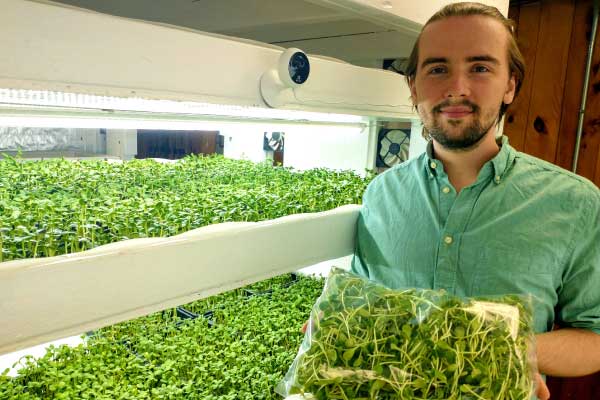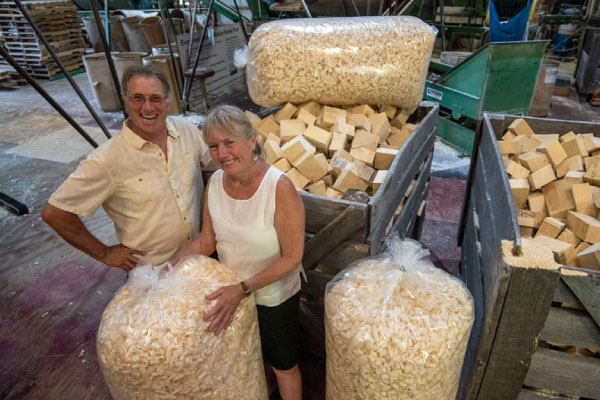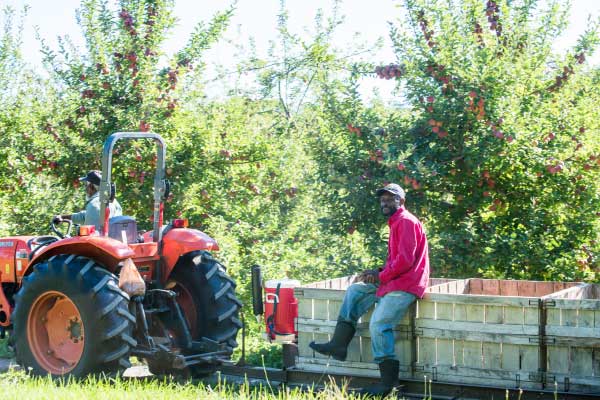by Kelsey Price | Sep 23, 2020 | Central Vermont, Meet Your Neighbors, Relocation Testimonials, Remote Work
“This was our zombie apocalypse house,” said Justin Will, gesturing to the two-story open floor plan home where he and his wife, Elise Willer, have unexpectedly spent the past six months.
For their entire professional lives, the two have been nomads. Justin and Elise were working in Africa when the news of the pandemic reached them in March; they knew things were going to change. They booked the last two international flights to the U.S. and arrived in Vermont, kissing the earth outside their rural home amidst the woods and farmland of Vershire.
For the first time since the couple purchased the home in 2019, they were prepared to stay long-term. Not only were they experiencing a global pandemic, they were also expecting their first child.
After graduating college, Justin enrolled in the Navy, serving stints on bases from Connecticut to Germany. In 2013, he went into the reserves to travel to Italy for a masters in coffee science. This education was the seed that sprouted his own coffee import and export business three years later, Inspire Coffee Merchants. Elise is a con-flict management consultant and trained mediator who works with organizations and companies nationally and internationally to provide training and coaching as they move through difficult situations. Prior to the pandem-ic, she frequently traveled to Africa, working in countries like Rwanda, where she had been leading a training workshop when the pandemic hit. Their work and lives meant that they traveled frequently and easily with no real home base.
“We’ve never had a good answer to the question, ‘where are you from?’,” said Elise in August, five months into their arrival to Vermont. “Now, when people ask us, it feels right to be able to say Vermont.”
When Justin and Elise purchased the unique, rural space from the architect, a friend of theirs, they had planned to continue to AirBnB the home. It had become popular on the home-sharing site for Vermonters and out-of-towners alike looking for a rural escape with little connectivity. They never anticipated they might live here given the distance from the nearest city and weak internet service. It was great for as a short-stay retreat, but it didn’t seem manageable long-term.
The pandemic changed things. Elise and Justin have both had to make working remote their new reality. In March, a happy coincidence made this easier: a fiber-optic internet cable to Vershire– a town with a population of less than a thousand– that gave them the bandwidth to work remotely from home.
“We’ve been really impressed by Vermont during this time. Our values were already aligned —pushing for com-munity, buying local,” said Elise. “And for as much as Vermonters love their state, we’ve also met so many people [since our arrival] who travel, live abroad and come back. The idea of Vermont as our homes base just feels really good.”
A place they had loved to visit, Vermont has surprised them with its diversity and strength in community. Since their arrival, Justin has been able to join via Zoom every town meeting that Vershire has held since March. They’ve also been able to source most of their groceries from small, local farmers. As Elise puts it, “Vermont is a place where you cannot only be a part of a community, but people encourage it. There’s been invitations to be a part of the community everywhere.
”There are still hurdles to overcome in order to make their Vermont base long-lasting. Sparse cell service, though sometimes appealing, can be problematic. “The nature of my job [as a business owner] is that I could be working at any moment,” says Justin. “That’s an issue when I have zero cell service and have to plan days that I’m inacces-sible when we travel to Brattleboro or other towns for necessities.”
Justin is eager to invest in the local economy and, prior to the pandemic, was on the verge of opening a coffee shop on a main street in a Southern Vermont town. If Vermont wants to hold onto the influx of millennials that have arrived due to the pandemic, he thinks it needs more accessible resources for these young professionals. “They want us to come, but these towns and regions don’t have a plan for us once we get here,” he says. “For instance, where should I open a coffee shop? Where should these new people like me put their efforts? I want this [increase in population] to have a multiplying effect. I am super excited to be here and I’m ready to keep the wave going, but where do I start?”
“We’ve never had a good answer to the question, ‘where are you from?’ But now, when people ask us, it feels right to be able to say Vermont.” -Elise
This story by the Vermont Futures Project originally appeared on https://vtfuturesproject.org/. Photos by Anna Watts.

by Kelsey Price | Sep 23, 2020 | Digital Media, Diversity, Food & Beverage, Meet Your Neighbors, Relocation Testimonials, Southeastern Vermont
“You’re going to need to figure something out,” Kiera Bratton-Lewis told her husband, Cory Bratton, over a phone call in early March. “It’s going to get bad.” She was referring to what was about to become the COVID-19 global pandemic and Cory’s newly renovated local Vermont restaurant, A Vermont Table.
Three years ago, after taking over the farm-to-table catering company, which was then located in Putney, Cory had renovated his dream space in Brattleboro with two large kitchens —one for catering and one for dine-in— a bright, well-lit dining area, and a classic-style bar for cocktails and drinks. When Kiera called Cory in March, it had been three weeks since the restaurant’s official opening.
After years working as a producer, writer, and director of indie films and documentaries in New York, Kiera was pursuing her dream of attending graduate school at the American Film Institute for screenwriting in Los Angeles. In early March, California was ahead of the East coast in the news about the coronavirus pandemic and Kiera was more worried than most, anxious about exposing her highly immunocompromised mother in Brattleboro during her spring break trip to Vermont. In preparation, she strictly self-quarantined, avoiding even the roommates in her small LA apartment.
On March 13th, as soon as classes were over, Kiera took a flight out of LA, dressed in two pairs of clothes, a plastic bag, a mask and a hairnet. “Everyone thought I was being crazy,” she said about her flight attire and self-imposed quarantine. “It was really lonely.” But she was adamant about protecting her mother and hometown from the potential of spreading the virus.
She arrived in Vermont with a new set of issues to face. Cory’s business relies heavily on its wedding season bookings, which are typically booked a year out and keep the catering company busy from spring to fall. By April, Cory was drowning in cancellations for the upcoming season. “It was a really tough time because they hadn’t put out any assistance,” said Cory. “I had to pay my bills.”
Growing up in Brattleboro, Kiera and Cory attended the same public elementary school. They were friends by high school and started dating in college. They both deeply valued the freedom that a childhood growing up in Vermont allowed. For Kiera, the pandemic has made this clearer than ever. “Vermont is the best place in the country to grow up right now. There are so many opportunities here to stay a child as long as possible. Especially now with social media, it’s so valuable to have spaces like this. I do imagine we’ll have kids in Vermont,” says Kiera, who has been previously ambivalent about whether to raise kids in Vermont, citing the lack of diversity. Growing up in Vermont, Kiera says, it’s not infrequent that out-of-towners assume she’s not from here, in spite of the fact that her father’s family has lived in Vermont for three generations.
These questions aside, the biggest hurdle the couple faces is how to survive. “The worst part about Vermont for young people is, ‘how do you make money?’ That’s why people leave,” says Cory, adding since his childhood he’s seen Brattleboro “shifting older, in general.” He’s had an unexpectedly difficult time finding electricians, plumbers, and other tradesmen to work on the restaurant construction. He understands that the limited supply of tradesmen will leave no replacements in the next generation.
Kiera sees a large disconnect between the new second homeowners moving to Brattleboro and the median income of the city, which lands at around $30,000 a year for most families. Both she and Cory want to see more training and programs accessible to young professionals in Vermont, more vocational schools for trade and artisan work. They see a huge potential for Vermont in this arena.
On a Saturday in late August, Cory cooks a takeout order coordinated by a concierge service for families requesting a meal to be prepared before their arrival to Vermont. Later, he will coordinate the week’s menu for 350 meals he cooks weekly as part of “Everyone Eats!,” a Vermont pandemic program that pays local restaurants to make meals for those in need. The program has provided a lifeblood for A Vermont Table for the past 6 months. Kiera is on a deadline working on a script that she thinks has the potential to be filmed. “I could totally film it here in Vermont,” she says, adding that it would be great to tap into Vermont’s many tradespeople, which would just need training specific to film and TV. “They are here, which is why I can make a movie here,” she says. “But the infrastructure for using these trades for entertainment is yet untapped!”
“Vermont is the best place in the country to grow up right now.” – Kiera

by Kelsey Price | Aug 31, 2020 | Agriculture, Food & Beverage
Author: Laura Carbonneau
Meet one of our newest producers—Grateful Greens! Based in Brattleboro, VT, Grateful Greens is a new business that approaches farming differently. With an all-indoor facility and highly nutrient-rich soil, their greens are out of this world and will be accessible year-round. They are developing their systems to be as self-sufficient as possible and to have the largest positive environmental impact by using solar, energy-efficient GREE heat pumps for climate control, developing a rainwater catchment system to water the plants they grow, using plant-based PLA for all of their packaging, and looking to improve
Owner James Mayer took some time to share about this new business and what makes them stand out!
What makes your produce unique?
Grateful Greens uses creative, low impact, indoor farming technology that utilizes solar, rainwater, eco-friendly systems, and Love. We grow in a nutrient-rich organic soil mix with organic seed from High Mowing Seeds to grow healthy, tasty, and extraordinarily sustainable crops, all year long.
What is your favorite product?
Our Sunflower Greens! This is the first crop we’re growing. The health benefits of sunflower greens are amazing. They’re super nutrient-dense, and their flavor and appearance are so unique and pleasant!
Why is selling locally and the local food movement important to you?
Strengthening the localization of our food systems is the main purpose of Grateful Greens! It is clear to us that local and proper food production and distribution are vitally important to the health of our selves, our local economies, and the Earth! Indoor farming is a valuable growing technique that can help us to be totally self-sufficient with our food needs, especially in the winter
How does working with Food Connects help your business and what are you excited about in this new partnership?
Partnering with Food Connects was a great accomplishment for Grateful Greens! The work that Food Connects does is so valuable to us all right now, such as their leadership in the Farm to School movement, their immense support of local food producers, and their curbside ordering program. Their vision for “healthy families, thriving farms, and connected communities” aligns greatly with the purpose of Grateful Greens to empower the food system of the Northeast to become healthier and self-sufficient, year-round. Partnering has given us a great opportunity to offer our Sunflower Greens to many retail and food service organizations in New England. I am especially excited to provide our nourishing greens to our schools in the region! Everyone at Food Connects is so kind and helpful and it’s clear that they want to help us succeed.
What inspired you to start Grateful Greens? What are some of your hopes for the future?
I have always been entrepreneurial and a lover of nature at heart. Before I founded Grateful Greens, I was working on a project that made me money and was helping others but did not have the immense potential impact that I knew I wanted to make. I got the initial inspiration from a YouTube video about indoor farming. Something instantly clicked inside me and I felt “This is it!” Since then, the vision has expanded greatly: from growing some greens in my bedroom closet, to a project that has the support of a very talented team of Vermont innovators (Delta Vermont) and is on the path of providing immense value to the food system and health of the Northeast. My biggest hope for this project is to greatly increase the self-sufficiency and health of the Northeast food system and its people.
Any events coming up or fun facts about your business/products?
We are talking with the arts organization Epsilon Spires to collaborate on offering events at their venue, where leaders in the local food movement can visit to educate and provoke thoughts and discussion around improving our food systems, as well as empowering ourselves and communities. We are also composting all the post-harvest root, stem, and used soil material to be reused in community projects that will hopefully unite, heal, and feed our communities. We have no solid plans yet, but I am hoping to create some type of permaculture farm/garden or similar projects in Brattleboro and surrounding areas. If an organization or individual has any ideas or would like to collaborate, please contact us!
How are you responding to the COVID-19 Crisis?
We are participating in the CARES Act’s “Everyone Eats” program, donating to the Vermont Foodbank regularly, and hope to supply Sunflower Greens for the Farmers To Families Food Box program.
Anything else you would like to share?
We will be expanding soon (creating another location) to grow several other crops to be locally available year-round. Let us know what crops you’d like to be locally available and fresh year-round!
This story by Food Connects originally appeared at https://www.foodconnects.org/fh-news-hub/2020/2020/8/31/producer-spotlight-grateful-greens

by Kelsey Price | Aug 12, 2020 | Entrepreneurship, Environment, Forest Products, Meet Your Neighbors, Northeast Kingdom
By KEN PICARD | Photo Credit JEB WALLACE-BRODEUR
When Jim Lovinsky cofounded Sylvacurl of Vermont in 1993, he didn’t envision it as a full-time, year-round job. Instead, he let the company, which makes and sells an all-natural wood alternative to plastic and polystyrene packing material, grow organically. And for much of its 27 years, Sylvacurl remained a small, mostly seasonal business, ramping up its operations in early fall in preparation for preholiday shipping orders, and then tapering off by mid-January.
But this year, after the pandemic hit and millions of Americans switched from buying consumer items in stores to ordering them online, demand for Sylvacurl’s eco-friendly packaging products exploded six months early.
It began, Lovinsky recalled, with an early spring phone call from one of his largest customers: Greensboro cheesemaker Jasper Hill Farm, which normally restocks its supply of Sylvacurl in August or September.
“All of a sudden I started getting orders from all over the place, which was incredible,” he said. “We had a very good spring.”
Indeed, Sylvacurl’s sales in the first half of 2020 were three times what they were the year before. Lovinsky suspects that much of it was due to consumers, stuck at home and not spending money in restaurants and stores, who began spending their federal stimulus money online. And as his clients’ internet sales took off, so did Sylvacurl’s.
The idea for the product originated in the early 1990s, Lovinsky explained, about the time when the Champion Lumber Company began scaling back its Vermont timber operations and selling off its vast forest holdings in the Northeast Kingdom. As the state’s wood products industry started suffering huge losses, Lovinsky — who at the time worked at a wood-turning company — read about wood shavings that were used as bedding material at racetracks in the South. He researched whether a similar product would work well as a lightweight and sustainable alternative to packing peanuts.
As he discovered, popple, or aspen trees, were ideally suited for this use. Popple grows quickly and abundantly throughout Vermont but has little market value. Lovinsky’s longtime supplier, Robert Lamarre, at Lamarre’s Sawmill in Brownington, described it as “junk wood” that’s also used to make toothpicks, tongue depressors and pulp for paper. But popple produces consistent white curls that hold their shape well in shipping containers. And, unlike pine and cedar, it has very little scent.
Lovinsky opened a small facility in a building in East Hardwick, which he calls their “shake-and-bake operation.” There, Lamarre’s mill delivers wood blocks that are cut specifically to fit Sylvacurl’s patented processor. The blocks are shaved into curls, shaken to remove sawdust, baked in dryers, then dumped into a hopper to be bagged and shipped.
Because the curls contain no added chemicals, perfumes or artificial colors, once they’re used as packing material, they can be composted, applied as livestock bedding or spread on gardens. In fact, Lovinsky’s wife and business partner, Mary-Ellen, raises goats and grows garlic commercially and routinely uses the curls for both operations.
In the late 1990s and early 2000s, Lovinsky recalled, the potpourri industry took a keen interest in Sylvacurl. Initially they bought it as filler material — that is, until the Southeast Asian market began producing more exotic and cheaper botanicals to replace it. “Who wants lowly wood curls when they can get that?” Lovinsky said.
However, most of Sylvacurl’s other clients have stuck with him over the years, in large part, he said, because their own customers find them visually appealing and environmentally friendly. These clients include iGourmet, an online food company in West Pittston, Pa.
“They order a trailer load, which is 500 bags. That’s big for me,” Lovinsky said. “Most of my customers order 10 to 30 bags at a time. I even have customers who show up in their car and pick up three or four bags. And that’s fine with me.”
In fact, Lovinsky heard from a woman who had ordered a product from Blanc Creatives, a Sylvacurl client in Charlottesville, Va., that makes hand-forged pots and pans. As he explained, the woman received an order from Blanc Creatives containing Sylvacurl, which she later used to light her barbecue grill. “She liked them so much,” he added, “she ordered a carton.”
Though business is booming and likely to get busier come fall, Sylvacurl hasn’t hired any employees; in fact, much of the time Lovinsky does all of the work himself, with occasional help from family members.
But he still works a full-time job as executive director of the Lamoille Housing Partnership, a Morrisville nonprofit that builds and operates affordable housing. Lovinsky has consulted with the local Small Business Development Center on a transition plan for if and when the time comes to scale up the business. Now 67, he expects to retire soon and devote himself full time to growing Sylvacurl.
“This [pandemic] may accelerate that a little bit,” Lovinsky added. “We’ll see how far it goes.”
A version of this article first appeared on sevendaysvt.com and in Seven Days newspaper, a Burlington-based newsweekly published on Wednesdays and distributed for free at more than 1,000 locations in northern and central Vt. and Plattsburgh, N.Y.

by Kelsey Price | Aug 5, 2020 | Agriculture, Food & Beverage
Author: Laura Carbonneau
If you’re traveling along Kipling Road in Dummerston, VT you may happen upon Scott Farm Orchard. The picturesque views of the orchard and farm buildings seem to take you back in time. And rightfully so. Scott Farm is owned by the Landmark Trust USA and is listed on the National Register of Historic Places—farmers have actively farmed the land there since 1791. We chatted with Simon Renault, Scott Farm Orchard’s new General Manager, who was very excited to share with us what’s been happening on the farm this season.
If you didn’t already know, the orchard boasts 130 different varieties of heirloom apples. It is incredible to imagine 130 different types of apples when our typical grocery stores may only carry up to 15 varieties! They also grow all kinds of interesting fruits like gooseberries, pawpaws, persimmons, delicious Japanese plums, peaches, pears, medlars—you name it! Their dedication to biodiversity and care for these heirloom varieties makes them stand apart.
And we can’t imagine having to pick a favorite, either for cooking or eating! “Calville Blanc is a favorite cooking apple, made famous by Julia Child’s who recommended it in her Tarte Tatin (a french apple tart),” says Simon. “Reinne de Reinette is also a favorite. The delights of a Blue Pearmain were described with such poetry by Thoreau. Black Oxford is an old Maine heirloom with a mild flavor, hard as rock which helps it store well; its flavors enhance over the winter. “ There are just too many to choose from!
And we know that our community loves their heirloom products. “More than 80% of our crop stays with a 75 miles radius,’“ says Simon. “Scott Farm has a deep commitment to our local community. Providing our neighbors with healthy fruit is our main concern and motivation. Food Connects helps us by distributing some of our fruit and getting us in touch with many local institutions with whom we do not already have a working relationship.”
With new leadership, the farm is focusing on a few new initiatives. “One of the very interesting things we have been working on is taking a closer look at is the antioxidant properties of heirloom apples. Apples have been found to have very strong antioxidant activity, inhibit cancer cell proliferation, decrease lipid oxidation, and lower cholesterol. Apples contain a variety of phytochemicals, including quercetin, catechin, phloridzin and chlorogenic acid, all of which are strong antioxidants. We have sent some of our oldest heirloom apples to labs to try to show the particular health properties of some of our apples. Particularly in this time of health crisis, it is very relevant for us to take a health lens on the work we do and consider that our number one priority.”
Not only are they expanding on their research efforts but their farm store is growing as well. “Our Farm Market has a much wider range of products this year. The current COVID-19 crisis pushed us to understand our market as a real service to our local community and we are delighted to be meeting that need.” Scott Farm Orchard, like many other farms we work with at Food Connects, is responding to the community need and demand for fresh, local food.
And they expanded their fall fruit CSA offering. “For 13 weeks, from Labor Day to Thanksgiving, CSA members will go home with a half peck of heirloom apples and other fruits. Every week they get to discover 2 different varieties of heirloom apples. Picking up a basket directly from the orchard (or at our other two pick up locations in Brattleboro and Putney) is a great way for people to shop for healthy nutritious food while staying safe.”
Scott Farm Orchard Is participating in Dig In Vermont’s Open Farm Week. Join them on August 13 and 15 for a virtual Hard Cider Tasting They are partnering with Eden Cider, a cidery based in Newport, Vermont that gets a lot of heirloom apples from us to make its harvest artisanal ciders.
So how do you do a virtual tasting? The way it works is that guests order a tasting kit from Eden Specialty Ciders (3 375ml bottles and a Scott farm glass) on their website and register for the tasting, then a zoom link will be sent via email. They encourage people to invite some friends or family and make it an event. The tasting will be guided by Eleanore, owner of Eden Specialty Ciders. Tastings include their dry cider (Brut Nature), an ice cider, and Siren Song Demi-sec. It promises to be really fun and a great voyage into the world of hard cider, for both the novice and the connoisseur.
This story by Food Connects originally appeared at https://www.foodconnects.org/fh-news-hub/2020/2020/8/5/producer-spotlight-scott-farm-orchard




